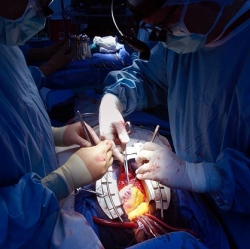
A Stanford group, led by Amin Arbabian, is working on a chip destined to be implanted in the body to keep tabs on internal biological processes and distribute drugs. To date, medical implants bristle with wires or, when they’re wireless, are made bulkier by batteries. Ideal implants would be wireless and battery-free.
Unlike chips to be embedded in inanimate objects, implanted chips need to be fully compatible with the human body and present minimal health risk. To that end, Arbabian chose ultrasound to power his chip. Ultrasound is already safely used for sensitive procedures, like fetal imaging, and can provide the needed power. How does it work? The chip houses a special piezoelectric material that flexes in response to incoming ultrasound waves creating a small amount of electricity.
